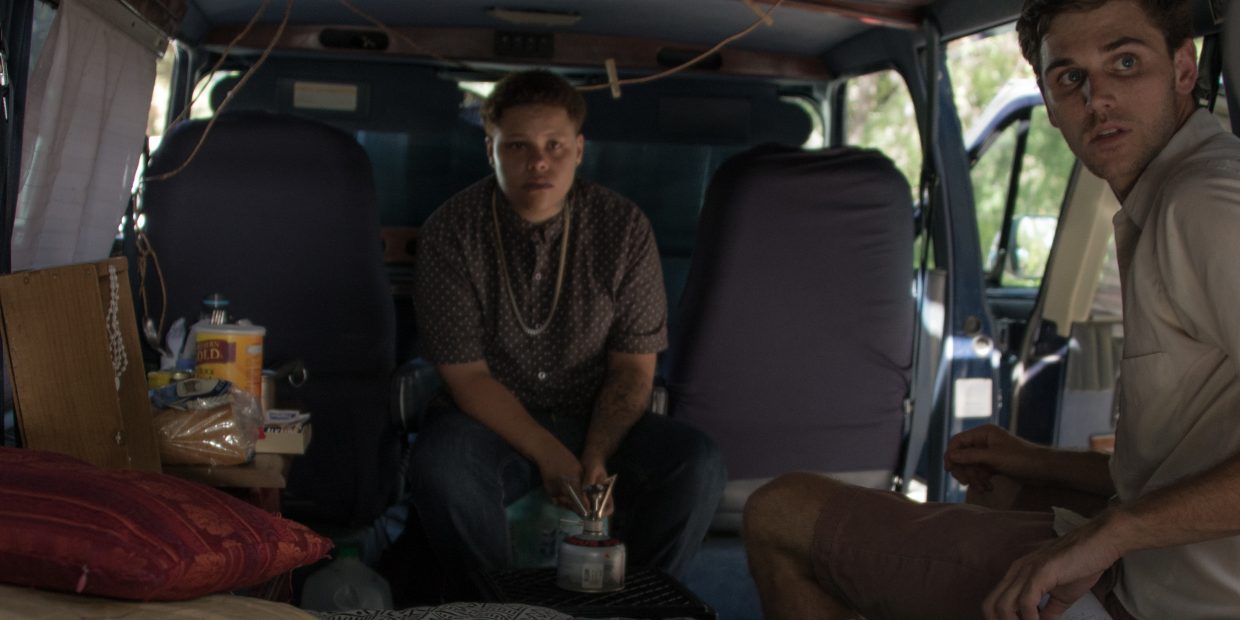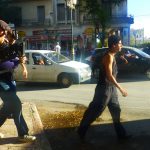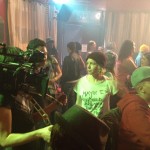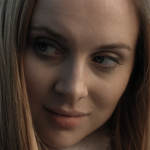By David Pountain
With the poignant, socially resonant short BobbyAnna, writer-director Jackson Kroopf crafts an intimate tale of nocturnal longing, economic hardship and the dynamics of class and culture. Legacy Bailey and Juliana A. Morgan prove a captivating couple as black, masculine-presenting street performer Bobby and white, middle-class college grad Anna respectively. When the former finds herself unexpectedly homeless, the change sends ripples through their relationship as the film probes beneath the surface of the contrasting personas of each woman to reveal the vulnerabilities beneath.
Speaking to FilmDoo, Kroopf provides some compelling context on the new short, which screened at this year’s East End Film Festival.
I’ve read that the film was inspired by your experiences working at a youth centre. Can you expand on this a little?
In 2011 I began working at a youth center in East Oakland called Youth UpRising (YU). YU provides a variety of services for young people (I was mainly working with 18-24 year-olds), many of whom struggle to gain access to resources, having left or been pushed out of school, been previously incarcerated, or who do not live in a stable home.
One young person, who I worked with closely on a writing project, revealed that she had been kicked out of the youth homeless shelter she had been staying in when they found out she was pregnant and had nowhere to go that night. I immediately had the urge to offer her a couch in the apartment I rented with my partner at the time, but that was neither a sustainable solution nor something that would have been appropriate according to the established boundaries set by the organization. That moment stuck with me: what models of community care do we follow for someone in such a vulnerable circumstance? I knew a couple of resources, but she had already exhausted them. I believe we need more resources for young people of color living in poverty, and I think we need more narratives highlighting how limited the existing resources are for people in emergency circumstances. There isn’t a real safety net here.
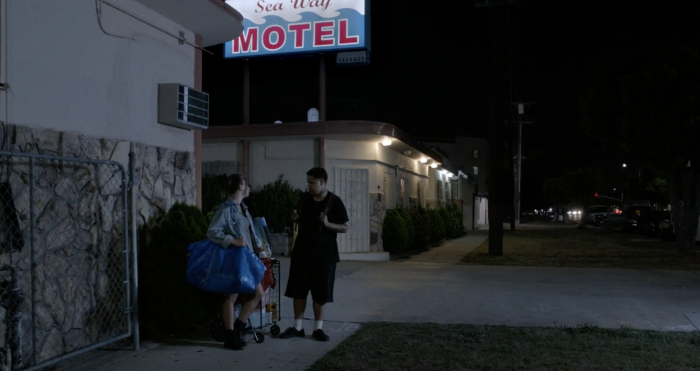
I also, like Anna, fall into the category of well-intentioned white folk working in the non-profit industrial complex living a stable life, who can make well-intended, but naïve decisions that adversely effect people of color, whom I care about. I’m interested in what it takes for those relationships across differences to be more transparent, honest, and potentially transformative for everyone involved.
Last thing: at YU, I had close friendships with two masculine of center black women who showed me a combination of tremendous resilience and sensitivity in their relationships with other women, in addition to their own creative expression. They both had this armor that I think was a combination of pride and readiness for attack from others that over time they expressed to be frustrating for some of their most intimate relationships. I say all that to say, most of the moments and interactions found in BobbyAnna are in some way connected to experiences I either was a part of, told, or observed directly.
The film features two strong, naturalistic lead performances. Did you work closely with the two actresses to develop these characters or was it more a case of the actresses simply bringing their own personalities to the table?
Yes, thank you, Legacy and Juliana did incredible work. We had 5 days of intensive 4-hour rehearsal before shooting. I did street casting based at ladies’ nights in LA that led to finding Legacy. Because I work with non-actors who usually have a direct relationship to the experience of the characters they play, they immediately become the author of that character once they’re cast. We poured over the script together changing lines and adding two key scenes based on Legacy’s input. The scatted song that begins the film is what Legacy does in the morning if she’s feeling anxious for relief. And the rap song she performs to make money after the break-in was not in the script. In fact we shot that documentary style with a long lens across the street, so most of those audience members/passerbys were not aware they were on camera until after she finished her performance.
In addition, Juliana, who played Anna and had more experience acting, immediately connected to Legacy and so their chemistry was consistent on and off screen. I’m in awe of actors and always intent on providing them with the opportunity to play, explore, and discover through performance. We spent the first couple of days playing games, running lines, figuring out blocking, and then turned to actually filming with a DSLR each scene, first in a classroom we rehearsed, then on location. Video storyboarding was a huge money and time saver for a very low budget shoot with 11 locations, mostly exteriors.
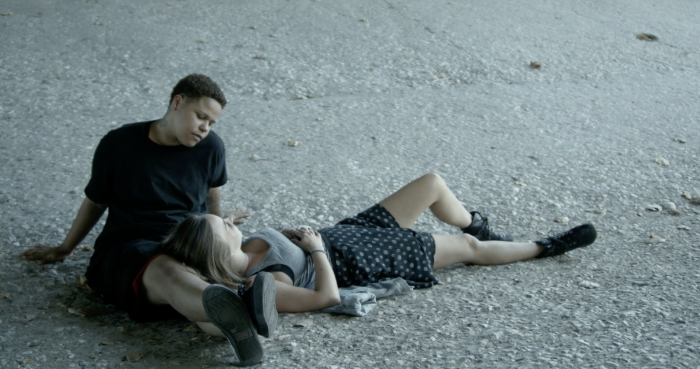
Why do you think these two women from such different backgrounds are drawn to each other?
Initially I think Anna is drawn to Bobby’s music and the way she carries herself. Similarly, Bobby is drawn to Anna’s boldness and flattered by her obvious interest. But over the course of the evening and following day, I think the thing that bonds them most is the extent to which each woman surprises the other with both a lack of negative judgement and a willingness to pursue a generous intimacy. Bobby anticipates judgment when they reach her van, but only finds an increasing interest from Anna. Anna expects discomfort from Bobby at hearing that she’ll join the massive wave of gentrifiers moving to Oakland, but instead is met with encouragement to explore.
Most one-night stand movies or scenes are quite lust-driven, and that’s not been the type of experiences I’ve had when initially meeting someone I’m drawn to; it’s much more about figuring out who the person is and what they think about the world. I wanted to see a dynamic that was awkward, uncomfortable, tender, and honest. I wanted to consider what it means to wait until you’re sure someone’s sober before being physically intimate. When two people from different backgrounds come together, there’s a ton of physical, emotional, intellectual knowledge that makes both differences and similarities sometimes exciting and sometimes troubling.
For Bobby, I feel that that performance and music are a source of pride and self-possession in difficult times. Is this something that you’ve observed in people?
Definitely. Music is amazing. Legacy had written the song “Destination” long before the film, but when she auditioned with it, it was shocking how well it fit the story. With singer-songwriters like Legacy, who are somewhat reserved most of the time, you sense that the music is in some way a more fluid communicative medium for them. Legacy is an amazing conversationalist, but I’ve learned just as much about her by closely listening to her music, and also seeing the extent to which she wants to share it. The agency one finds in creative expression, particularly when other parts of your life lack agency, is certainly a motivating factor to keep creating for Bobby and Legacy.
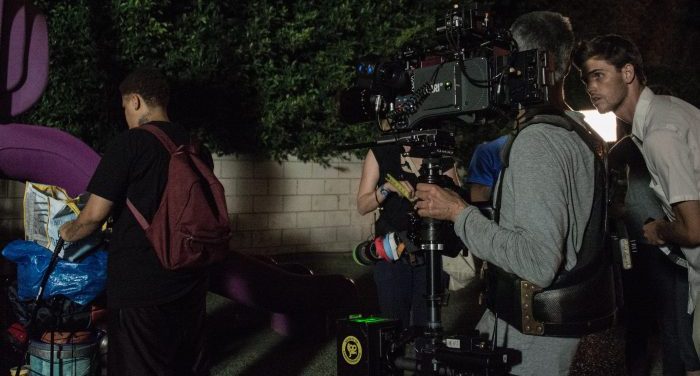
On a cultural or socioeconomic level, do you feel that there’s anything viewers might learn from watching this film?
Yes! For me cinema has long been a source of learning, of osmosis. Many times I have found myself reckoning with how the challenges and questions facing a character on screen apply to my own life. I want viewers to ask themselves what they’d do if they were in Bobby’s shoes after she hangs up the phone with her Grandma. I want them to reflect on when they’ve hidden their resources because they’re embarrassed of their relative wealth and privilege, and what it would mean to break down some of those boundaries constructed in relation to American myths of “individualism” and “exceptionalism”.
In the U.S., particularly in urban settings, para-military police departments have become increasingly effective at invisibilizing houseless folks with a variety of laws and architectural design choices at places like bus stops and benches. I believe housing should be a human right, but also want people to recognize the tremendous creativity and resilience of people without homes, who resist philanthropic situations that, to them, compromise some of their dignity. I love films that are immersive and structured in such a way that is organic; not telegraphed nor didactic. I also love films that grab you in the throat and/or chest, and by the time you’re released you wonder why you feel shook. These are all of the things I was thinking about with BobbyAnna. I think we were able to achieve some of these things, and hopefully will be even more effective in the next project.
Do you know what this next project will be?
Yes, thanks for asking. I’m just wrapping up post-production on a documentary short called not only one that was my thesis film for my MFA in Social Documentation at UC Santa Cruz. That’s a film in which I collaborated with three young people from East Oakland on their own portraits to reflect on their daily lives, and plan for new ways to thrive. It explores how the reflection involved in attempting to represent oneself by forming interview questions for your family and friends (that you might not ask otherwise) can catalyze new, positive action within one’s life.
I’m also starting pre-production on a longer form documentary about the impact the Raiders’ leaving Oakland has on low-income women of color who work at the stadium and have stood by the Raiders for over 20 mostly losing seasons. Additionally, I’m collaborating on a screenplay with a close friend and talented Latinx poet Angel Dominguez, about two Latinx siblings taking care of each other after their parents are deported. Lastly, Legacy (the star of BobbyAnna) and I are chipping away at a feature concept that is more closely aligned with her experiences with religion and the justice system since making the short film.

